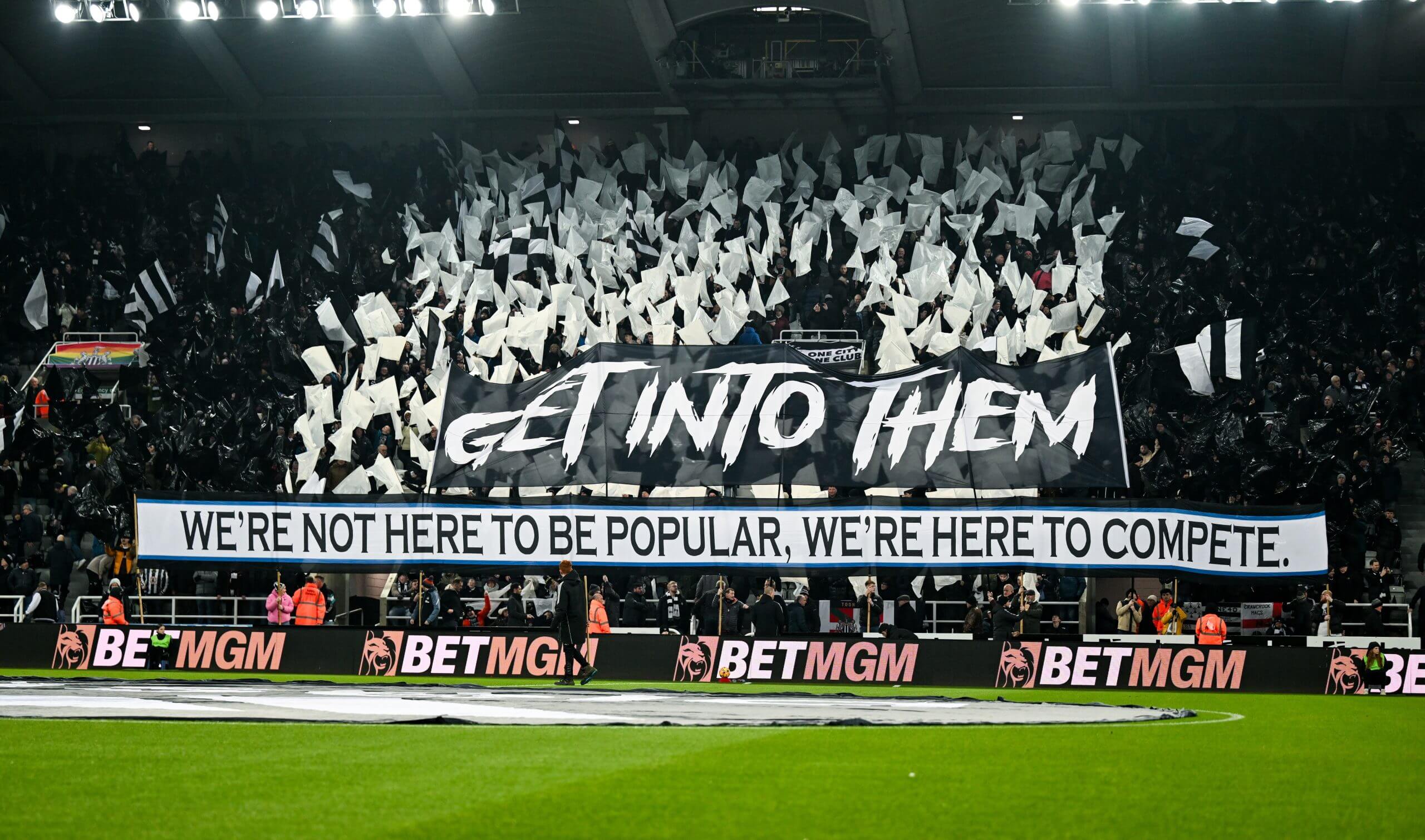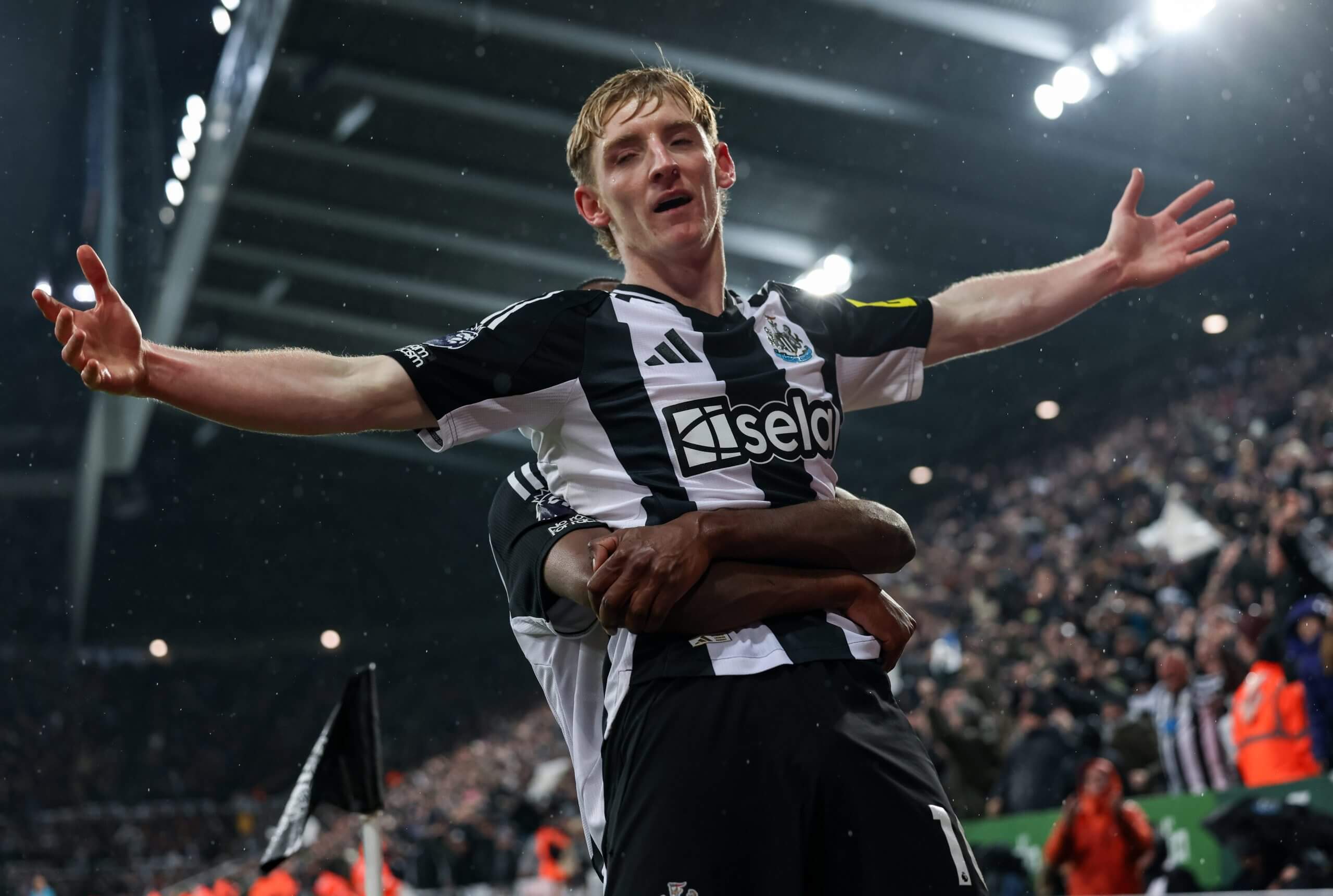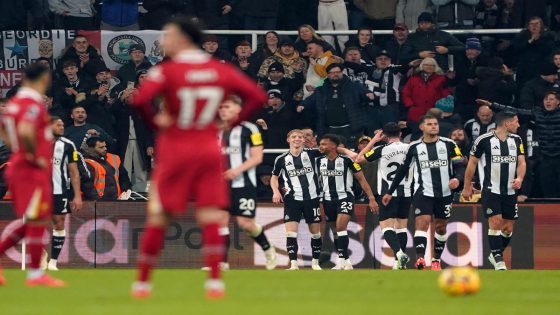Newcastle United are footballing concussion.
They play badly, they play well, they are soft touches and then tough nuts and just when you think you have got them pinned down as one thing, they mutate into another, bouncing off the walls, smashing headfirst into something else, leaving themselves reeling and their supporters with a headache. Ibuprofen is their identity.
Should fans be happy, angry, energised, confused? After this thrilling, throbbing draw against the Premier League leaders, that should be a redundant question, except that it came haring behind that moribund 1-1 at Crystal Palace, who at that stage were bottom-feeders. Anybody can have an off-day, but this season has already had enough turning points to bring on head-banging nausea.
Palace cued grumbles and navel-gazing, with Eddie Howe warning about the perils of “staleness” infecting a squad which has not been meaningfully upgraded over successive transfer windows. Stale? Newcastle’s performance against Liverpool was a squirt of Cologne directly up the nostrils. They were as fresh and cleansing as a hurricane.
Within its own context, what a marvellous, compelling 3-3 draw. Within its own context: just wow. Newcastle twice took the lead and were worthy of it, picking off Liverpool, tormenting them at the back. Twice Arne Slot’s players responded, much improved in the second half, as they fought to avoid a second defeat this season. And then they were ahead, with an icky, familiar feel of game over.
With 90 minutes up, Bruno Guimaraes floated a deep free-kick towards the far post and, in a moment of brain-freeze — desperately unfortunate and entirely appropriate — Caoimhin Kelleher, the goalkeeper, allowed it to drop behind him. Fabian Schar was running in, straining for nothing other than to “keep the ball in play”, but he stretched and met it and scored.
It was a whizzbang of action and emotion, penalty appeals, challenges, frantic VAR checks and a final whistle that Howe was certain came prematurely as his players mounted one last attack. It was a forget-yourself game, a masterpiece of mayhem which allowed no room for thought aside from the simple stuff, like this: Newcastle excelled.

Within the context of the mood and matches around it, explanation is tricky. Excellence is nonsense. No shots on target at Palace, one within two minutes against an exceptional side, all those themes which have formed and then dissipated. From positive results and negative performances to the opposite; from that resurgence against Chelsea, Arsenal and Nottingham Forest, to deflation and defeat against hapless West Ham.
As Howe appraised “a big leap forward”, he acknowledged his own frustration that Newcastle could be this good immediately after being so bad. “Yes, that’s very much in my head,” he told The Athletic. “We weren’t perfect but we were everything we want to be tonight in terms of attitude, body-language, demeanour, energy, pressing.”
It felt telling that he name-checked those fundamentals, rather than Newcastle’s attacking, goalscoring or quality, all of which were significantly improved. The last half-hour against West Ham was “the low point”, he said, and now “they need to hit these standards consistently. That is the challenge for the players to deliver.”
But who and what are this Newcastle team? Just as players crave certainty — and there was not enough of it last summer — so managers want to know what to expect from their team. It has been elusive for Howe. “That’s a fair assessment and I’ve made it clear to the players,” he said. “We have to find a solution together.”
Amid this consistent inconsistency, there is one trend running through Newcastle’s season — their apparent aversion to possession.
It is not just that Newcastle prefer to play in transition, or that they appear uncomfortable and shorn of ideas when forced to take the initiative. The evidence, when it comes to results, is borderline irrefutable: when Newcastle have less of the ball, they are more effective, more threatening, and more successful.
That has largely been the case throughout Howe’s tenure but, with their on-field evolution stalling, primarily due to the strangulating nature of Profit and Sustainability Rules, this pulsating draw demonstrated that reverting to past strengths may perversely be Newcastle’s best route forward.
Strangely, the five matches in which Newcastle have the least possession this season have all been on Tyneside. The three with their lowest possession shares — Southampton, Tottenham and Arsenal — delivered Newcastle’s three home victories. The other two provided a point apiece against Manchester City, four-times-in-a-row title winners, and Liverpool, seemingly champions-elect.
| Result | Possession share |
|---|---|
|
Newcastle United 1-0 Southampton
|
22.2%
|
|
Newcastle United 2-1 Tottenham Hotspur
|
34.3%
|
|
Newcastle United 1-0 Arsenal
|
36.1%
|
|
Newcastle United 1-1 Manchester City
|
37.7%
|
|
Newcastle United 3-3 Liverpool
|
41.2%
|
|
Newcastle United 0-2 West Ham United
|
52.8%
|
|
Newcastle United 0-1 Brighton & Hove Albion
|
59.9%
|
When Newcastle have been permitted possession and asked to break teams down, however, they have largely struggled. West Ham and Brighton are the only two home matches in which Newcastle have had more of the ball. The aggregate score? 0-3.
Liverpool was a prime example of when Newcastle get it right, when their intensity is there and the team press as a cohesive group, that they can smother opponents, regardless of their form and quality.
The midfield trio of Guimaraes, Sandro Tonali and Joelinton quashed claims they cannot play together, harrying as a unit, regularly nicking the ball from Ryan Gravenberch and Alexis Mac Allister during the first half. Newcastle won possession four times in the final third, their joint-second-most this season. Liverpool simply could not cope with Newcastle’s athleticism and pace at times, with four shots produced from fast breaks — a campaign high.

Alexander Isak scored the opener with a devastating finish having turned Virgil van Dijk inside and out. Howe described this as Isak’s “best performance” this season and Guimaraes and Anthony Gordon also stepped up against top-class opposition once again. Guimaraes laid on two assists, while Gordon scored Newcastle’s second, should have added another and encapsulated the ferocious speed at which Howe’s team can play.
The problem is such a game-plan is unsustainable across a 38-game season and Newcastle’s elite players cannot merely reserve their peak form for elite teams. Brentford on Saturday becomes another test, one they have routinely flunked.
“We’ve always been good on the break,” Jacob Murphy said. “It’s part of your development that you have to have different assets. We’re working hard to find solutions to make our overall game really good. In-possession, out-of-possession, counter-attack — everything. We’re working on becoming the full package.”
With only two wins in 10 in the league, Newcastle are far from that right now. Unless that package contains migraine tablets.
(Top photo: Owen Humphreys/PA Images via Getty Images)





